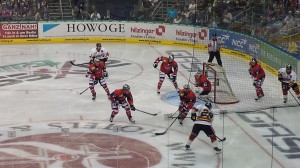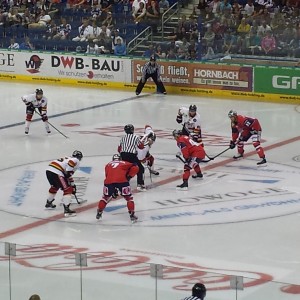While August has been a rather quiet month for hockey in North America, the clubs in Europe have gotten their season under way as they vie for the European Trophy. This year, the road to the European Trophy runs through Berlin, both figuratively and literally.
Eisbären Dominance

That is because Berlin is not only the host city of the championship game, but also home to the Eisbären, one of the most successful professional hockey teams over the last decade. Not only have Eisbären Berlin won the European Trophy once in 2010, they captured the Deutsche Eishockey Liga (DEL) title in seven of the last nine seasons. They’ve clearly established themselves as not just the most dominant franchise in Europe, but possibly the most successful team in all of hockey.
The European Trophy
For those fans unfamiliar with “Europe’s premium club competition,” it can most easily be compared as the UEFA Champions Leagues of hockey. This installment of the European Trophy has 32 teams competing from seven different countries, making it the largest hockey tournament in Europe.
As per the website, The 32 European Trophy teams are divided into 4 divisions: North, South, East and West. Each team plays two games, one home and one away, against its local rival in the division. Additionally each team also plays one game against each of the other six teams (not the local rival) in the same division, for a total of eight games per team (4 home, 4 away). All group winners advance to the finals as well as the team with the best record not to win their division and the host team. From there, a Final 6 tournament takes place, comprised of two groups of three teams.
Dating back to its days as the Nordic Trophy – when only Scandinavian teams competed – no team has won the tournament twice. So the Eisbären will be chasing history as they look for their second title.
New Era, New Challenges
This season for Eisbären Berlin will be one present with new challenges. The biggest being, trudging forward without former head coach Don Jackson who had tremendous success in Berlin winning the German championship in five of the six seasons he was behind the bench. Over the summer, Jackson signed with FC Red Bull Salzburg of the Erste Bank Eishockey Liga in Austria.

Trying to fill the void left by Jackson is Jeff Tomlinson. Although Tomlinson is only 43-years-old, he comes in with a lot of playing and coaching experience, which includes previous stints with the Eisbären. After playing for Eisbären Berlin for three seasons, he took on the head coaching roll for the Junior Eisbären and then was an assistant under Jackson from 2007-09, before getting the opportunity to coach his own team in the DEL by accepting an offer from the DEG Metro Stars. Before moving back to Berlin, Tomlinson had a brief stint with the Nüremburg Thomas Sabo Ice Tigers.
Tomlinson told Der Tagesspiegel he always liked how Eisbären played an offensive game and doesn’t plan to cap their aggressive style, but will put more of an emphasis on defense, especially with the departures of Ryan Caldwell and Mark Katic from the blue line.
Thus far, the Eisbären have shown difficulty adjusting to the new changes. Through four games of play in European Trophy division play, the team has recorded just four points (winning once, losing twice in regulation and losing once in overtime), which has them sitting in sixth out of eight teams in the North division.
During the tournament, the Eisbären have only managed to score six goals, including just two over the last three games. The team will need to do a better job cashing in opportunities if it hopes to continue its success from previous seasons. However, it might be best not to read too much into Eisbären Berlin’s play since they get an automatic pass to the finals as the host city. If anything, these division games should be looked at as a final tune up before play in the DEL begins.
Regardless of what’s to come for the team, according to Tomlinson the German capital has become “Hockeytown.”